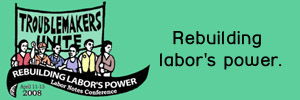Call Center Workers Win in Test of Card Check Ruling

In New Hampshire's biggest private sector organizing win in four decades, 588 AT&T call center workers who handle passport processing questions joined Communications Workers (CWA) Local 1298 in early January.
Workers said they plan to change their low pay, expensive and limited health care, and high turnover.
"There are a lot of stress factors involved in the job," said Darlene Perry, a member of workers' committee inside the facility. "People feel better now that we have the union. They feel like things are going to change."
The campaign was the first major test of the National Labor Relations Board's September Dana/Metaldyne decision (see Labor Notes January 2008), which allowed anti-union employees 45 days to derail a union chosen by a majority of their coworkers. As soon as workers show they have a majority of authorization cards (known as a "card check" recognition) the board decided anti-union employees can petition for decertification if 30 percent oppose the union.
NEUTRALITY DEAL KEY
The New Hampshire workers were aided by a national neutrality agreement between CWA and AT&T. Despite the agreement, Peter Dobroski, a customer service representative who's signed up to be a steward, said workers had to fight rumors that the work would be outsourced.

SUPPORT LABOR NOTES
BECOME A MONTHLY DONOR
Give $10 a month or more and get our "Fight the Boss, Build the Union" T-shirt.
The card check was certified by the American Arbitration Association on November 5, but workers had to wait until January to see if a small group of opponents would manage to overturn their majority.
The call center is in Dover, a town of 26,000 about an hour north of Boston. A full-time worker at the center makes less than $22,000 a year, and carries a family health insurance deductible of $5,000. Management cut full-time status to 35 hours a week three months ago, forcing workers to take overtime when it's offered.
New younger workers streamed into the center seven months ago to handle a crush of calls from panicked vacationers realizing they needed passports to visit most foreign destinations.
Perry said many were not well trained, and new workers constantly lose their jobs because the work requires a security clearance--a risk not apparent in AT&T's recruiting, she said.
"They get rapport with people, they get to know the work, then they're gone," she said. "It doesn't make for happy people."




